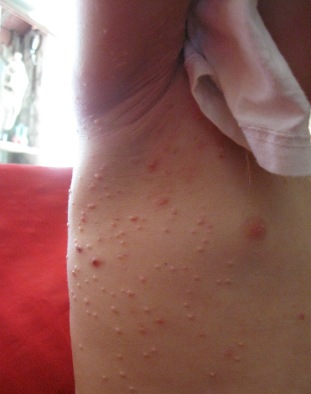Recurring molluscum is not very common. While molluscum is not an unusual condition, most people that get it only get it one time. Then it goes away and they never get it again. In rare cases, though, molluscum keeps coming back. We’ll tell you why that might happen and what to do about it if it does.
Who Gets Recurring Molluscum?
People most likely to get repeated bouts of molluscum are those with impaired immune systems, such as people with HIV (human immunodeficiency virus) or AIDS (acquired immune deficiency syndrome). People taking certain medications that suppress the immune system, like corticosteroids, some medications used to treat autoimmune disorders, and some medications are taken by organ transplant recipients to prevent rejection, are also at risk for recurring bouts of molluscum. People with atopic dermatitis (eczema) may also be at increased risk, especially young children and elderly people.
Recurring Exposure

According to the Centers for Disease Control and Prevention (CDC), the molluscum contagiosum virus does not lie dormant in the body like some viruses do, such as the herpes virus. If you had molluscum and the infection cleared up completely, and then you develop more molluscum bumps, it means you’ve been exposed to the virus and caught it again.
You might get recurring bouts of molluscum if you are exposed to the virus over and over again. Sometimes family members pass it back and forth to one another, much like they might pass a common cold back and forth. Adults sometimes get molluscum on their genital areas and pass it back and forth through sexual activity. For this reason, doctors usually recommend getting treatment for molluscum even though it usually goes away eventually without any medical treatment. It’s a highly contagious condition and until the infection goes away, you can spread it to others with whom you have contact.
What if You Keep Getting Molluscum?
If you have recurring molluscum, you need to see a doctor. Molluscum usually goes away on its own without any medical treatment, so some people with the condition choose not to see a doctor. If you get the condition repeatedly, though, medical attention is warranted. It’s often an indication that your immune system is not functioning properly, so it’s important to get things checked out. Your doctor may order some blood tests or other tests to help figure out what’s going on.
It’s also possible you don’t really have molluscum at all but some other skin condition that looks similar, so see your doctor find out for sure. While molluscum is generally not considered a serious condition, some other conditions that may look similar are more serious and do require medical attention.
If you’re being exposed to molluscum over and over again, your doctor should be able to help you figure out how to avoid that.
Does Molluscum Ever Go Away?
Yes, almost always. It can take a while, though. Normally, molluscum takes anywhere from 12 weeks to a whole year to clear up without treatment. With treatment, you can expect it to go away faster. Whether you get treatment or not, try not to scratch the affected areas because that can spread the infection to other areas of your body and increase the time it takes to go away.
As we explained earlier, if you have molluscum that doesn’t go away or that keeps coming back, it’s an indication that something is wrong. See your doctor find out what’s going on and how to treat it.
Our Preferred Treatment For Molluscum
Our preferred treatment for molluscum is a natural remedy called Naturasil. It contains a unique combination of plant extracts with antiviral properties that speed the healing process. If you have recurring molluscum, we still recommend you see a doctor, but Naturasil can help you recover from the infection. Let your doctor know if you are using Naturasil or any other natural remedies. To learn more about our preferred treatment for molluscum, follow this link to the Naturasil Website.
